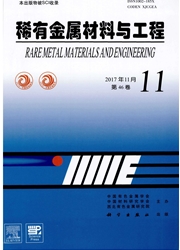

 中文摘要:
中文摘要:
In order to improve the electrochemical hydrogen storage performance of the Mg2Ni-type electrode alloys, Mg in the alloy was partially substituted by La, and the nanocrystalline and amorphous Mg2Ni-type Mg20-xLaxNi10 (x=0, 2) alloys were synthesized by melt-spinning technique. The microstructures of the as-spun alloys were characterized by X-ray diffraction (XRD), scanning electron microscopy (SEM) and transmission electron microscopy (TEM). The electrochemical hydrogen storage properties of the experimental alloys were tested. The results show that no amorphous phase is detected in the as-spun Mg20Ni10 alloy, but the as-spun Mg18La2Ni10 alloy holds a major amorphous phase. As La content increases from 0 to 2, the maximum discharge capacity of the as-spun (20 m/s) alloys rises from 96.5 to 387.1 mA·h/g, and the capacity retaining rate (S20) at the 20th cycle grows from 31.3% to 71.7%. Melt-spinning engenders an impactful effect on the electrochemical hydrogen storage performances of the alloys. With the increase in the spinning rate from 0 to 30 m/s, the maximum discharge capacity increases from 30.3 to 135.5 mA·h/g for the Mg20Ni10 alloy, and from 197.2 to 406.5 mA·h/g for the Mg18La2Ni10 alloy. The capacity retaining rate (S20) of the Mg20Ni10 alloy at the 20th cycle slightly falls from 36.7% to 27.1%, but it markedly mounts up from 37.3% to 78.3% for the Mg18La2Ni10 alloy.
 英文摘要:
英文摘要:
In order to improve the electrochemical hydrogen storage performance of the Mg2Ni-type electrode alloys, Mg in the alloy was partially substituted by La, and the nanocrystalline and amorphous Mg2Ni-type Mg20-xLaxNi10 (x-=0, 2) alloys were synthesized by melt-spinning technique. The microstructures of the as-spun alloys were characterized by X-ray diffraction (XRD), scanning electron microscopy (SEM) and transmission electron microscopy (TEM). The electrochemical hydrogen storage properties of the experimental alloys were tested. The results show that no amorphous phase is detected in the as-spun Mg20Ni10 alloy, but the as-spun Mg18La2Ni10 alloy holds a major amorphous phase. As La content increases from 0 to 2, the maximum discharge capacity of the as-spun (20 m/s) alloys rises from 96.5 to 387.1 mA.h/g, and the capacity retaining rate (S20) at the 20th cycle grows from 31.3% to 71.7%. Melt-spinning engenders an impactful effect on the electrochemical hydrogen storage performances of the alloys. With the increase in the spinning rate from 0 to 30 m/s, the maximum discharge capacity increases from 30.3 to 135.5 mA.h/g for the Mg20Ni10 alloy, and from 197.2 to 406.5 mA-h/g for the Mg18La2Ni10 alloy. The capacity retaining rate (S20) of the Mg2oNi10 alloy at the 20th cycle slightly falls from 36.7% to 27.1%, but it markedly mounts up from 37.3% to 78.3% for the Mg18La2Ni10 alloy.
 同期刊论文项目
同期刊论文项目
 同项目期刊论文
同项目期刊论文
 Electrochemical hydrogen storage characteristics of nanocrystalline Mg20Ni10-xCux (x=0-4) alloys pre
Electrochemical hydrogen storage characteristics of nanocrystalline Mg20Ni10-xCux (x=0-4) alloys pre Microstructure and hydrogen storage characteristics of melt-spun nanocrystalline Mg(20)Ni(10-x)Cu(x)
Microstructure and hydrogen storage characteristics of melt-spun nanocrystalline Mg(20)Ni(10-x)Cu(x) Hydrogen Storage Behaviours of Nanocrystalline and Amorphous Mg20-xLaxNi10(x=0-6) Hydrogen Storage A
Hydrogen Storage Behaviours of Nanocrystalline and Amorphous Mg20-xLaxNi10(x=0-6) Hydrogen Storage A Structures and electrochemical hydrogen storage behaviours of La0.75-xPrxMg0.25Ni3.2Co0.2Al0.1 (x=0-
Structures and electrochemical hydrogen storage behaviours of La0.75-xPrxMg0.25Ni3.2Co0.2Al0.1 (x=0- Improved hydrogen storage behaviours of nanocrystalline and amorphous Mg(2)Ni-type alloy by Mn subst
Improved hydrogen storage behaviours of nanocrystalline and amorphous Mg(2)Ni-type alloy by Mn subst Enhanced electrochemical characteristics of as-spun nanocrystalline and amorphous Mg(2)Ni-type alloy
Enhanced electrochemical characteristics of as-spun nanocrystalline and amorphous Mg(2)Ni-type alloy Influences of Substitution of Zr for La on Structures and Electrochemical Performances of A(2)B(7)-T
Influences of Substitution of Zr for La on Structures and Electrochemical Performances of A(2)B(7)-T Influence of rapid quenching on hydrogen storage characteristics of nanocrystalline Mg2Ni-type alloy
Influence of rapid quenching on hydrogen storage characteristics of nanocrystalline Mg2Ni-type alloy Investigation on electrochemical performances of melt-spun nanocrystalline and amorphous Mg(2)Ni(1-x
Investigation on electrochemical performances of melt-spun nanocrystalline and amorphous Mg(2)Ni(1-x An electrochemical investigation of melt-spun nanocrystalline Mg20Ni10-xCux (x=0-4) electrode alloys
An electrochemical investigation of melt-spun nanocrystalline Mg20Ni10-xCux (x=0-4) electrode alloys Hydrogenation and dehydrogenation behaviours of nanocrystalline Mg20Ni10-xCux (x=0-4) alloys prepare
Hydrogenation and dehydrogenation behaviours of nanocrystalline Mg20Ni10-xCux (x=0-4) alloys prepare Hydrogen storage behaviours of nanocrystalline and amorphous Mg20Ni10-xCox (x=0-4) alloys prepared b
Hydrogen storage behaviours of nanocrystalline and amorphous Mg20Ni10-xCox (x=0-4) alloys prepared b Electrochemical hydrogen storage characteristics of nanocrystalline and amorphous Mg20Ni10-xCox (x=0
Electrochemical hydrogen storage characteristics of nanocrystalline and amorphous Mg20Ni10-xCox (x=0 Hydriding and dehydriding characteristics of nanocrystalline and amorphous Mg20-xLaxNi10(x=0-6) allo
Hydriding and dehydriding characteristics of nanocrystalline and amorphous Mg20-xLaxNi10(x=0-6) allo An electrochemical investigation of melt-spun nanocrystalline and amorphous Mg2Ni-type electrode all
An electrochemical investigation of melt-spun nanocrystalline and amorphous Mg2Ni-type electrode all Hydriding and dehydriding characteristics of nanocrystalline and amorphous Mg20Ni10-xCox (x=0-4) all
Hydriding and dehydriding characteristics of nanocrystalline and amorphous Mg20Ni10-xCox (x=0-4) all Investigation on the structures and electrochemical performances of La0.75-xZrxMg0.25Ni3.2Co0.2Al0.1
Investigation on the structures and electrochemical performances of La0.75-xZrxMg0.25Ni3.2Co0.2Al0.1 An investigation on the hydrogen storage characteristics of the melt-spun nanocrystalline and amorph
An investigation on the hydrogen storage characteristics of the melt-spun nanocrystalline and amorph 期刊信息
期刊信息
